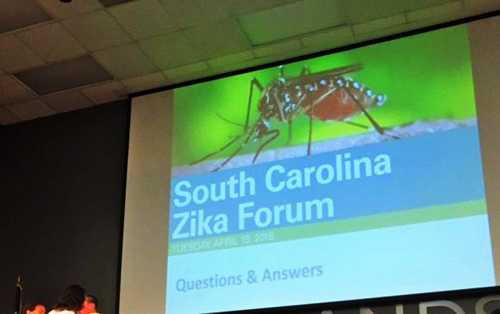Features from the Front Line: South Carolina
Spotlight on South Carolina Department of Health & Environmental Control

On April 19, 2016, the South Carolina Department of Health and Environmental Control (DHEC) hosted a forum for state and local leaders focused on stopping the spread of Zika.
Improving Surveillance of Zika and Other Birth Defects
Since the emergence of Zika virus (Zika) infection in the Americas, the South Carolina Department of Health and Environmental Control (DHEC) has responded swiftly, collaborating with providers, fellow state agencies, and local emergency responders throughout the state to enhance surveillance and screening of pregnant women and infants exposed to Zika.
“Zika has really brought into focus the overall problem of birth defects, the need for robust surveillance, and the need for services for these infants,” says Vinita Leedom, MPH, of the South Carolina Birth Defects Program. With CDC funding, the state has hired its first full-time birth defects epidemiologist and is currently hiring additional staff to collect data. The state has collected data on birth defects associated with Zika since mid-2016 and has since expanded to all birth defects recommended for surveillance by CDC.
“The potential for local transmission of Zika virus created a need for the SC Birth Defects Program to establish a baseline for birth defects associated with Zika. This has been a challenge because there are many Zika-associated conditions we did not collect information on prior to the Zika outbreak in the Americas,” explains Leedom. CDC has helped DHEC adapt its state surveillance system to establish a baseline and compare before-and-after rates of birth defects related to Zika.
Embracing Partnerships
DHEC also has partnered with Help Me Grow, a program linking families to community-based resources and services for children at risk for developmental, behavioral, or learning problems. “Help Me Grow is also working with one of our state’s pediatric neurologists at the University of South Carolina to educate the early intervention community about Zika virus. They’re taking referrals of infants with Zika exposure so that they can be routinely screened for developmental delays,” Leedom says.
Reaching People in the Community
DHEC has collaborated with PASOs, a nonprofit group that supports health care among Latinos in South Carolina, to provide Zika prevention education to Latina women in the community. Outreach to the general community has also included messaging at airports, bilingual radio PSAs about prevention of Zika and other mosquito-borne diseases, multilingual flyers for camps, schools, clinics, and universities, and a PSA broadcast at local minor league baseball games. “We took a multi-faceted approach in terms of outreach and education for staff, state residents, and tourists,” says Tameca R. Wilson, Zika Outreach Program Coordinator, Division of Women’s Health Outreach/Education.
A DHEC epidemiology medical consultant delivered Zika training to clinicians in every region covering Zika symptoms, testing, and how to provide patient counseling around Zika. DHEC’s Birth Defects program plans to continue enhanced surveillance as CDC funding allows over the next year and share findings with partners. Leedom says the program also plans to refer all infants with birth defects to early intervention “so families may more directly benefit from our surveillance system.”
- Page last reviewed: August 18, 2017
- Page last updated: August 18, 2017
- Content source:


 ShareCompartir
ShareCompartir